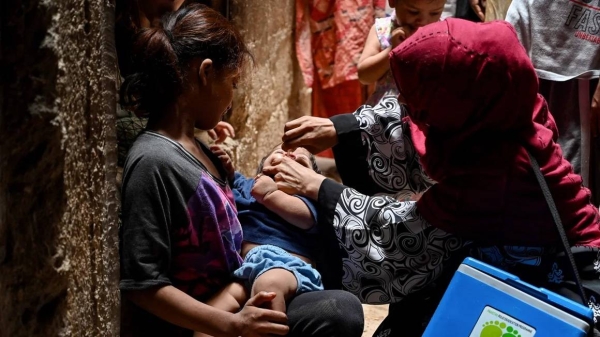Polio is once again becoming a major threat in Pakistan, as officials report more than a million children missed their vaccination doses last month. This has led to a recent uptick in polio cases in the country, with more than a dozen new infections in October alone. The total number of cases this year has risen to 39, compared to just six last year when Pakistan was on the verge of eliminating the virus. Ayesha Raza, the Focal Person to the Pakistani Prime Minister on Polio Eradication, blamed the increase in cases on low vaccine uptake and the disruption of immunization efforts due to the Covid-19 pandemic.
Polio is a highly infectious viral disease that mainly affects children under the age of 5, causing paralysis, respiratory issues, and even death. It spreads primarily through contaminated water or food and there is no cure, but it can be prevented with a vaccine. Worldwide, polio cases have been reduced by more than 99% since the 1980s thanks to immunization campaigns. However, Pakistan, along with neighboring Afghanistan, are the only two countries where polio remains endemic, according to the World Health Organization (WHO).
Vaccination programs in Pakistan have faced challenges due to historical distrust of foreign health care providers, religious beliefs, and lack of awareness about the dangers of polio. Allegations of a fake immunization program being used by US intelligence officials in Abbottabad in 2011 as part of efforts to capture Osama bin Laden further fueled the distrust. International NGOs and Pakistani authorities have been working to dispel rumors and vaccinate children, but misinformation continues to hinder public health efforts.
Most of the recent polio cases in Pakistan are clustered in Balochistan province, bordering Afghanistan, where parents are reluctant to vaccinate their children due to misinformation and distrust of health care providers. The children who have been infected had been partially vaccinated but did not complete all four required doses. Violent attacks against vaccination clinics have also increased, with militants targeting police and security officials. Attacks on polio workers have been reported in Khyber Pakhtunkhwa province, with several incidents resulting in casualties.
Despite the challenges, Pakistani authorities are optimistic about stopping the spread of polio. A new nationwide polio vaccination campaign was launched on October 28 with the aim of inoculating 45 million children under the age of 5. The country is working towards stopping polio transmission by 2025. The recent surge in cases has prompted officials to step up surveillance efforts and address gaps in previous vaccination campaigns. With concerted efforts and international support, Pakistan hopes to overcome the obstacles in eradicating polio and protect its children from this debilitating disease.











